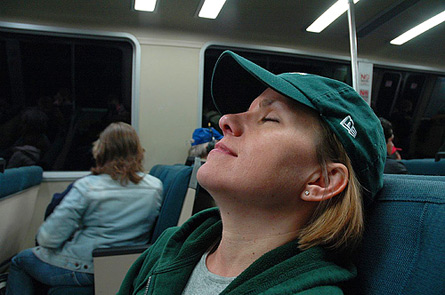Hey batter, wake up!
Baseball teams that travel across the country may be at a disadvantage when they play
Share this:
- Share via email (Opens in new window) Email
- Click to share on Facebook (Opens in new window) Facebook
- Click to share on X (Opens in new window) X
- Click to share on Pinterest (Opens in new window) Pinterest
- Click to share on Reddit (Opens in new window) Reddit
- Share to Google Classroom (Opens in new window) Google Classroom
- Click to print (Opens in new window) Print
 |
|
Baseball players who travel across time zones may lose more games. |
| silent (e) via Flickr |
Next time your favorite baseball team loses a game on the road, you might be able to blame it on the time zone. Just as travelers often experience jet lag when they fly long distances, a new study shows professional baseball players don’t always play well when they travel from one time zone to the next.
That may be because the body needs one full day to adjust its internal clock for each time zone it crosses. Travelers sometimes call this adjustment “jet lag,” a term that refers to the way their body rhythms, like waking and sleeping, get disrupted by traveling to far-away places on airplanes. Jet lag also can cause other problems, like a grouchy mood, headaches and difficulty concentrating or functioning.
A trip across the country — from Seattle to New York City, for example — crosses three time zones. That’s why there’s a three-hour difference in time between the two cities: When it’s noon in Seattle, it’s already 3 p.m. in New York. So the players on a baseball team making that trip will still feel like they are on Seattle time when they arrive in the new time zone. Being out-of-sync by three hours puts the visiting team at what scientists call a circadian disadvantage compared to the home team, the researchers say. (That’s assuming the home team hasn’t been traveling far from home too! If so, the home team would face a similar circadian disadvantage.)
By the second day after traveling, the players will still be at a two-hour disadvantage because their bodies still haven’t caught up to the time difference. It will take a full four days for the players’ bodies to fully adjust to the same time zone as their home-team rivals.
The time zone difference counts, say the researchers at the Martha Jefferson Hospital’s Sleep Medicine Center in Charlottesville, Va. They studied the outcome of more than 5,000 major league baseball games over 10 years in which one team had at least a one-hour circadian advantage over the other. They found that with a one- or two-hour advantage, teams won 52 percent of the time. But a three-hour advantage gave teams an even bigger boost. Teams whose opponents crossed three time zones to play won a full 60 percent of the time.
What happens when both teams travel extremely long distances? The researchers haven’t studied that yet. But consider this: When the Boston Red Sox and the Oakland Athletics battled it out in Japan in April, each team won one game and lost one. Evidence that both teams were at a circadian disadvantage? Nobody can say for sure. But for fans who like to keep stats on their favorite teams, “time zone difference” might be a new one for them to follow.
Going Deeper:







